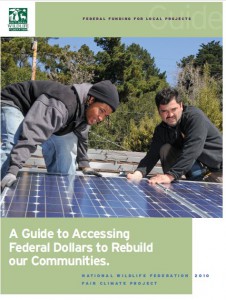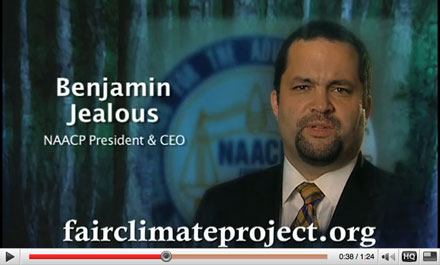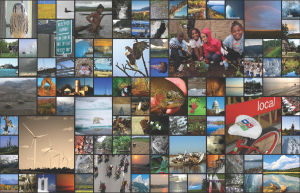| Location: Washington, DC |
| Department: Conservation Programs & Education |
| Duration: Internship |
| Salary: $10.00/hour
Click Here for More Details and Application Instructions
|
| Position Description |
|---|
| NWF’s Fair Climate Project empowers leaders from under-served communities to promote fair, equitable, and economically sustainable solutions to the climate crisis. The intern will work within the Global Warming Team to help address global warming solutions and to engage diverse constituencies in this important dialogue. He/She will also assist with NWF’s regional fair climate summits, bringing together diverse constituents across the U.S. to engage in a dialogue on the necessary efforts to address climate change at the local, national and international level.
Intern assignment will include:
|
| Position Requirements |
| Experience and/or Training: College graduate; political science and/or environmental policy/advocacy; strong interest in the federal legislative system. Experience working with domestic or international climate change frontline communities on environmental justice issues a definite plus.
Skills: Should have excellent research, writing and communication skills; excellent phone and interpersonal skills; the ability to multi-task, and to meet strict deadlines. Computer literacy a must (MS Office suite and internet applications are used constantly) The GW Intern will work with diverse organizations and individuals to collaborate on and organize various fly-ins, campaigns, and summits. Demonstrated commitment to environmental advocacy is desirable. Some campaign work experience is preferred. Hours are typically 9-5, but some evening and/or weekend work will be required periodically. Hours won’t exceed 40 hours per week. |
More extremely hot summer days are projected for every part of the country, and 30 large cities are especially vulnerable, detailed in a new report from the National Wildlife Federation and Physicians for Social Responsibility.
“Global warming is bringing more frequent and severe heat waves and the result will be serious for vulnerable populations,” said Dr. Amanda Staudt, climate scientist, National Wildlife Federation.
“That means air pollution in urban areas could get worse, bringing increased risk of heart attacks, strokes and asthma attacks. Children, the elderly, poor, and people of color are especially vulnerable to these effects.”
Extreme Heat in Summer 2010: A Window on the Future
Many Americans in the eastern and southern United States have been sweltering during Summer 2010. As global temperature records have been set for the early summer months, states and cities are also setting numerous temperature records. Unfortunately, climate models indicate that an average summer in 2050 will have even more days topping 90°F if global warming continues unabated. This supplement to National Wildlife Federation’s 2009 report More Extreme Heat Waves: Global Warming’s Wake-Up Call examines just how hot Summer 2010 is shaping up to be and the implications for air pollution, health, and the economy.
Read the Full Report Here: Extreme Heat in Summer 2010: A Window on the Future
]]>Hip Hop, National Wildlife, and Five Years After Katrina
Rev. Lennox Yearwood and Larry Schwieger
Sunday marks the five year anniversary of Hurricane Katrina and the levee breach that left the great American city of New Orleans clinging to life preservers.
As a result of Hurricane Katrina, and the government’s failed response in 2005, an estimated 2,000 people died, and hundreds of thousands were displaced. A hundred thirty thousand acres of wetlands were washed into open water within a twenty four hour period. A natural disaster was turned into an unnatural catastrophe as a result of poor decision making, from inadequate levees and flood control to slow and insufficient emergency response to long term polices that have eroded the wetlands that are the first natural line of defense from hurricanes.
Unfortunately many of these poor decisions continue to be made. Uncapped carbon pollution is leading to global warming fueled mega-storms. Louisiana still loses an area of coastal wetlands the size of 32 football fields every day. Gulf residents continue to have high unemployment and, for many, employment options are limited to the natural resource extraction that is causing many of the ecological problems.
Five years later we have collectively failed in our national obligation to restore and rebuild the Gulf Coast as well as ensure that Katrina survivors have the right to return.
Now, the BP oil spill on April 20th of this year killed eleven workers, and has crippled local economies in the Gulf Coast. It has further destroyed critical wetlands, severely hurt sea turtle and pelican populations, and put the public at risk for health problems of which we do not yet know the implications.
It’s time to make better decisions. We need restoration on both sides of the levee to fully recover. Restoring the coastal wetlands that protect our communities from storm surge is key to a resilient, sustainable New Orleans. Creating green jobs restoring our resources, not degrading them, will be critical to the long term economic prosperity of the Gulf Coast. We need the Senate’s support — and with oil in our marshes, now more than ever — to restore our coast and protect New Orleans — an American treasure.
The U.S. Senate should pass comprehensive energy and oil spill legislation that will reduce carbon pollution that leads to more powerful storms and provide a dedicated fund for the restoration of America’s imperiled wetlands.
]]> National Wildlife Federation’s
National Wildlife Federation’s
Fair Climate Project
]]>
Join actor and activist Gloria Reuben and Benjamin Jealous, President of NAACP, and become part of National Wildlife Federation’s Fair Climate Network.
]]>When: June 28th thru July 2nd
Where: The Russell Senate Office Building Rotunda, Washington, DC 20510 ]]>
Louisiana Bayoukeeper, Inc
The boat ride, out, from Lafitte, Louisiana, Sunday, May 23, 2010, to our fishing grounds was not unlike any other I have taken in my life, as a commercial fisherman from this area. I have made the trip thousands of times in my 35 plus years shrimping and crabbing. A warm breeze in my face, it is a typical Louisiana summer day. 3 people were with me, my wife Tracy, Ian Wren, and our grandson, Scottie. I was soon to find out, how untypical this day would become for me, not unlike a death in the family. This was going to be a very bad day for me.
As we neared Barataria Bay, the smell of crude oil in the air was getting thicker and thicker. An event that always brought joy to me all of my life, the approach of the fishing grounds, was slowly turning into a nightmare. As we entered Grand Lake, the name we fishermen call Barataria Bay, I started to see a weird, glassy look to the water and soon it became evident to me, there was oil sheen as far as I could see. Soon, we were running past patches of red oil floating on top of the water. As we headed farther south, we saw at least a dozen boats, in the distance, which appeared to be shrimping. We soon realized that shrimping was not what they were doing at all, but instead they were towing oil booms in a desperate attempt to corral oil that was pouring into our fishing grounds. We stopped to talk to one of the fishermen, towing a boom, a young fisherman from Lafitte. What he told me floored me. He said, “What we are seeing in the lake, the oil, was but a drop in the bucket of what was to come.” He had just come out of the Gulf of Mexico and he said, “It was unbelievable, the oil runs for miles and miles and was headed for shore and into our fishing grounds”. I thought, what I had already seen in the lake was enough for a lifetime. We talked a little while longer, gave the fisherman some protective respirators and were soon on our way. As we left the small fleet of boats, working feverishly, trying to corral the oil, I became overwhelmed with what I just saw.
I am not real emotional and consider myself a pretty tough guy. You have to be to survive as a fisherman. As I left that scene, tears flowed down my face and I cried. Something I have not done in a long time, but would do several more times that day. I tried not to let my grandson, Scottie, see me crying. I didn’t think he would understand, I was crying for his stolen future. None of this will be the same, for decades to come. The damage is going to be immense and I do not think our lives here in South Louisiana will ever be the same. He is too young to understand. He has an intense love for our way of life here. He wants to be a fisherman and a fishing guide when he gets older. It is what he is, it is in his soul, and it is his culture. How can I tell him that this may never come to pass now, now that everything he loves in the outdoors may soon be destroyed by this massive oil spill? How do we tell this to a generation of young people, in south Louisiana who live and breathe this bayou life that they love so much, could soon be gone? How do we tell them? All this raced through my mind and I wept.
We continued farther south towards Grand Terre Island. We approached Bird Island. The real name is Queen Bess Island, but we call it Bird Island, because it is always full of birds. It is a rookery, a nesting island for thousands of birds, pelicans, terns, gulls etc. As we got closer, we saw that protective boom had been placed around about two thirds of the island. It was obvious to me, that oil had gone under the boom and was fouling the shore and had undoubtedly oil some birds. My God. We would see this scene again at Cat Island and other unnamed islands that day. We continued on to the east past Coup Abel Pass and more shrimp boats trying to contain some of the oil on the surface. We arrived at 4 Bayou Pass to see more boats working on the same thing. We beached the boat and decided to look at the beach between the passes.
The scene was one of horror to me. There was thick red oil on the entire stretch of beach, with oil continuing to wash ashore. The water looked to be infused with red oil, with billions of, what appeared to be, red pebbles of oil washing up on the beach with every wave. The red oil pebbles, at the high tide mark on the beach were melting into pools of red goo in the hot Louisiana sun. The damage was overwhelming. There was nobody there to clean it up. It would take an army to do it. Like so much of coastal Louisiana, it was accessible only by boat. Will it ever be cleaned up? I don’t know. Tears again. We soon left that beach and started to head home.
We took a little different route home, staying a little farther to the east side of Barataria Bay. As we approached the northern end of the bay, we ran into another raft of oil that appeared to be covering many square miles. It was only a mile from the interior bayous on the north side of Barataria Bay. My God. No boats were towing boom in this area. I do not think anyone even knew it was there. A little bit farther north, we saw some shrimp boats with boom, on anchor, waiting to try and protect Bayou St. Dennis from the oil. I alerted them of the approaching oil. I hope they were able to control it before it reached the bayou. We left them and started to head in.
My heart never felt so heavy, as on that ride in. I thought to myself, this is the most I’ve cried since I was a baby. In fact I am sure it was. This will be a summer of tears for a lot of us in south Louisiana.
]]>
Albuquerque, New Mexico
The Southwest Fair Climate Summit will bring together regional leaders representing tribes, low-income communities, communities of color, and other stakeholders who share a common vision of rebuilding our communities.
Summit Goals:
- Share success stories and model initiatives for building strong, sustainable community
- Discuss critical issues related to the human and natural resource impacts of climate change, renewable energy, and effective partnerships with a diverse set of leaders from across the Southwest
- Provide information about funding and grant opportunities for building a green energy economy
- Strengthen and renew relationships among leaders committed to a vision of rebuilding communities through dialogue and equitable solutions.
Register Today! Space is limited! No registration fee
Travel scholarships available.
*Pre-Summit Reception on the evening of June 14th
For more information please contact Erica Anderson at [email protected] or 202-797-6618.
Host Committee: Native Workplace, New Mexico Wildlife Federation, Sierra Club, New Energy Economy & National Wildlife Federation
]]>
FAMU Earth Day Event
Declare Your Energy Independence Today!
40 years after the first Earth Day, the world is in greater peril than ever, but there is also an unprecedented opportunity to build a new future. Earth Day Revolution has the power to bring about historic advances in climate policy, renewable energy, green jobs, and to catalyze millions who can make personal commitments to sustainability by mobilizing the power of people to create change. This can be done by taking small steps in our homes, our schools and our businesses that add up to an enormous collective action.The Fair Climate Project is partnering with the Hip Hop Caucus for a HBCU Tour from Florida to Arkansas to North Carolina.
Earth Day Revolution is a pivotal opportunity for people, corporations, and governments to join together to create a global green economy. Our coordinated efforts now will be recognized by future generations as a turning point.
The declaration demands that the Senate to act on clean energy and climate change and it asks: “We have a question for members of the US Senate: Whose side are you on – Big Oil and their lobbyists or the Clean Energy Patriots?”
Follow the Earth Day Revolution on Twitter by searching #EarthDayRev
]]>Worse Spring Allergies
Spring a mixed blessing for allergy sufferers. Tree pollen is the most common trigger for spring hay fever allergies. With spring arriving 10 to 14 days earlier than it did just 20 years ago, pollination is already starting sooner. New maps in the report show projected increases in habitat conducive to more allergenic trees.
Worse Fall Allergies
In the fall, ragweed is projected to thrive and become more irritating under increased carbon dioxide levels. Ragweed plants at today’s carbon dioxide levels are likely produce about twice as much pollen as they would have 100 years ago. The pollen production rate could double again if we keep adding carbon dioxide to the atmosphere.
More Asthma Attacks
Global warming is especially bad news for the millions of asthmatics in the United States whose asthma attacks are triggered by allergens. They will have to cope with more abundant and severe allergens plus likely increases in ground-level ozone pollution, particularly in urban areas. High
ozone concentrations can trigger asthma symptoms and make bronchial airways less able to cope with allergens.
More Health Costs
These potential impacts of global warming could have a significant economic impact: allergies and asthma already cost the United States nearly $33 billion annually in direct health care costs and lost productivity.
Local Effects
The report warns that fungal spores, poison ivy and even allergic reactions to bee stings could be on the increase.
- State “Hotspots” at risk of high increases in allergenic tree pollen: Arkansas, Iowa, Maine, Minnesota, New Hampshire, New York, Pennsylvania, Vermont and West Virginia.
- State Hotspots at risk of moderate increases in allergenic tree pollen: Connecticut, Illinois, Kentucky, Massachusetts, Mississippi, Tennessee and Wisconsin.
- Worst Cities in the United States for Asthmatics and for Spring and Fall Allergies
